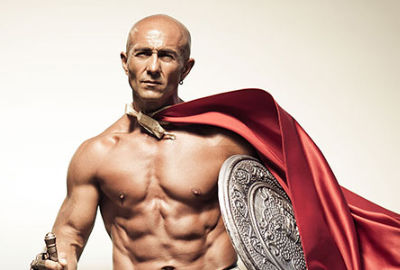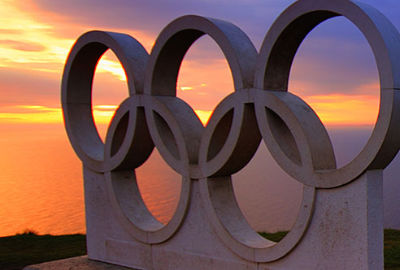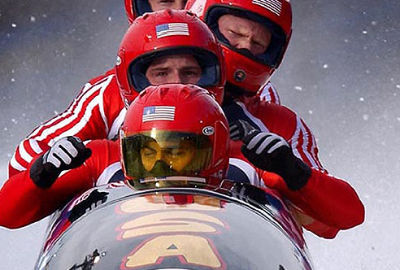The Olympics began in Ancient Greece as religious ceremonies. The first records of the Olympics date back to 776 B.C., when the games lasted only one day. They were held every four years until they ended in 394 A.D. According to legend, Hercules was the person who initiated the Ancient Greek Olympics about 1200 B.C. Archaeological evidence corroborates the date, but not the person.
The Olympic Games are not historically documented until 776 BC, but it is widely accepted that they had been in practice from as early as the 13th century BC. There are several Greek legends that speak of the beginnings of the Summer Olympic Games. One indicates that it was begun when Herakles won a race then asked that the race be run every four years. Another legend mentions King Iphitos who asked the Oracle of Delphi how to deal with a current war that was ravaging his country. The Oracle advised him to hold games in honor of the gods, which would require a truce. Whatever the origins of the Olympic tradition, it is obvious that it was originally of a religious nature.
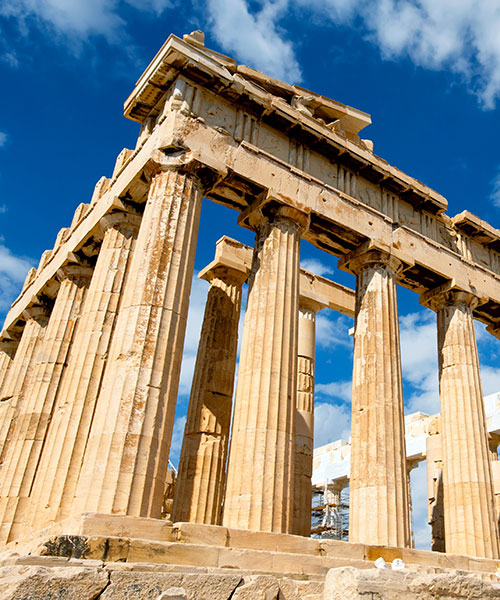
The Site of the Ancient Greece Olympics
Olympia was the site of the Olympics of Ancient Greece, because it was a natural amphitheater situated among the wooded slopes and plains of the region between the Alpheus and Claudius Rivers. It was also conveniently located, so it was possible to reach this site by ship, allowing participants to come here from faraway locations. The Olympics was a time of peace for Ancient Greece, as there was a truce declared a month before to allow all participants to travel safely to Olympia. Any city that broke this truce could be fined by having all their athletes banned from the competition.
Olympia was the site of a religious festival held in Ancient Greece. It was here that the Olympics first started as part of a religious ceremony in which the ancient Greeks paid homage to Zeus and fallen heroes. Prayer and sacrificial offerings preceded the events of the games.
How Ancient Greeks Knew of the Olympics
Runners were sent to every part of the country in the year in which the games would take place in order to let everyone in Ancient Greece know of the Olympics. These heralds, as they were called, announced a scared truce for one month of the year. This event was the forerunner of the carrying of the torch, which takes place as a prelude to the modern Olympics.
Competitors in the Olympics of Ancient Greece
Competitors had to be free born to participate in the Olympic games, which exempted slaves from taking part in the games. There were separate competitions for men and boys. Youths were placed in divisions for the competition depending on their age, strength, and physical size. Although women were not permitted to take part in actual physical competitions, they were permitted to take part in equestrian events. However, a woman had to be an owner of a chariot team or a horse in order to compete in these events.
Prizes for Winners of Ancient Greek Olympics
Winner of competitions were crowned as victors with crowns made from olive leaves taken from the burial place of Zeus. A winner also received the option of having a statue of himself set up at the site in Olympia. Upon returning to his hometown, a victor was treated as a celebrity and received treats such as free meals and the best seats at public events. Athletes in these Olympics in Ancient Greece competed for the glory of Zeus, and as winners, they felt that Zeus had looked favorably upon them.
Athletics were very important to the male population of Ancient Greece, and the education of every boy included training in athletics as well as other subjects. The Ancient Greeks were very competitive, with each one striving to be the perfect athlete. It was, therefore, one of the highest honors to be crowned a winner at the Olympics of Ancient Greece. The winner of the Olympics also had the Olympiad named after him. There were no second prizes at these Olympics, so the goal was to win and be the best of all competitors.
Games of the Ancient Greek Olympics
The competitions of the early Olympics of Ancient Greece consisted mainly of races. The first Olympics contained only a 200-yard foot race, called the stade. Then came another competition, the diaulos, the 400-yard race, and finally, the pentathlon was introduced. The pentathlon was an event that consisted of several tests of strength and endurance, such as discus throwing, javelin, long jump, running, and wrestling. There were ten events in total, which also included chariot racing and horse racing. Women were permitted to take part in the last two sports.
The first day of the Ancient Greek Olympics was devoted to religious ceremonies. Competitors took an oath that they would abide by the rules of the games. Footraces followed on the next day, and on the subsequent days, there were events of boxing, wrestling, and a combination of boxing and wrestling known as pancratium. The sports played at these games were very brutal and did not end until one of the competitors admitted defeat.
Judges of the Olympics of Ancient Greece
Judges for the competitions of the Ancient Greek Olympics were all chosen from one place – Ellis. This was because Olympia was part of the region of Ellis. Cheating was not permitted under any circumstances. A competitor caught cheating was fined.
The Ancient Greek Olympics never did become a secular event. Up until the time they ended, they still retained the religious significance for both the competitors and the onlookers.
The Olympics in Ancient Greece.
The history of the Olympics begins in Olympia, where they were first held. The ceremonies held for the winners were similar to those we hold today but instead of medals they received palm branches to hold and red ribbons which were tied around their heads and hands as a sign of their victory. At the completion of the games there was another ceremony and they would be crowned with a wreath of olive branches. When the athletes returned home they were often awarded large sums of money and fame, just like our present day Olympic athletes.
The Sports of Ancient Olympic Games.
The ancient Olympic Games had their roots in only one competition, a foot race called the stadion or stade. It was the distance of one stade, or sprinting from one end of the stadium to the other which measured about 200 meters. The earliest known documents that mention the Olympic Games are from 776 BC, and Coroibus of Elis is listed as the winner of the race. The events included the stade, the diaulos, which was similar to the 400 meter race and the Pentathlon. The Pentathlon was another ancient sport and included the stade, the diaulos and a long race called the dolichos which was from 1400 meters to 4800 meters. There was also a race called the Hoplitodromos and entailed running about a mile in armor weighing from 50 to 60 pounds. This was particularly grueling and was a display of military strength, speed and stamina. Also included were boxing and wrestling, as well as the equestrian sports of riding and chariot racing.
The Athletes of Ancient Olympic Games.
The athletes that participated in the ancient Olympic Games were of the highest quality and prestige. They performed nude as the body was viewed as a thing of great beauty. Only Greek speaking men were allowed to compete in the ancient Games, however these men came from all the different areas in Greek city-states and colonies. The athletes had to qualify and meet the requirements of the Games. Women were not only excluded from participating in the games, but they were not allowed to observe them, as this was considered a sacred activity only for men.
The ancient Greeks had established a long and valuable tradition in their Olympic Games. They were celebrated every four years during August and September. They held the Games until the forth century BC when the Roman Emperor Theodosius, abolished them due to their pagan roots.
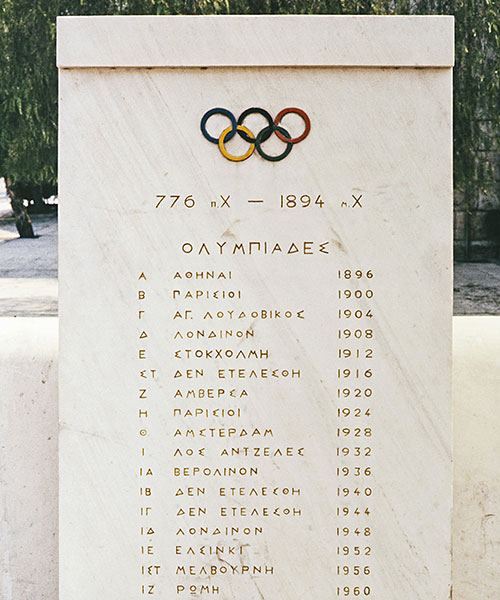
The Beginning of the Modern Games.
The modern Olympic Games have much in common with those of ancient Greece. They were reestablished by a French aristocrat, Baron Pierre de Coubertin, who urged the founding of the International Olympic Committee in 1894. The committee originally scheduled the first modern Summer Olympic Games for the year 1900, but later pushed that date back to 1896. They were held in Athens Greece during the first week of April. The games included 14 countries and had over 200 participants, but most of them were Greek. Women were not allowed to compete in the 1896 Summer Olympic Games and did not make an appearance until the year 1900, when they competed in lawn tennis and golf.
The1936 Summer Olympics were held in Germany, amidst the Nazi regime of pre-World War II. We see the beauty and spirit of the 1936 Summer Olympics in the amazing victory of Jesse Owens who won four gold medals all while dealing with the immense pressure of racism and hate. Hitler was looking forward to showcasing his supposedly superior German Arian athletes but Jesse Owens proved him wrong by winning a gold medal in the 100 meters, 200 meters, the long jump and the four person 100 meter relay. The 1936 Summer Olympics was truly a memorable and important step in the right direction towards racial equality and justice.
The 1996 Summer Olympics repeated the feelings from the 1972 Winter Olympics when a terrorist group kidnapped 7 Israeli athletes. The 1996 Summer Olympics are remembered most for the terrorist attack that killed one and injured over a hundred more, but the games continued. There was a large turn out with 196 countries competing. The 1996 Summer Olympic Games heralded two new sports, softball, and soccer, and the US women won the gold medal in both new sports. Michael Johnson won double gold medals in the 200 meter and the 400 meter as did a French woman Marie Jose Perac.
The 2000 Summer Olympics show another record turnout and bridging of hostility for the Games. 199 nations gathered to celebrate, and North Korea and South Korea united to enter the field under the same flag and uniform. Ian Thorpe of Australia broke his own world record in the 400 meter freestyle and managed to take four medals, three of which were gold. The 2000 Summer Olympics show the US softball team defending its previous win with a new medal and Michael Johnson wins the gold in the 400 meter. The 2000 Summer Olympics also marked the turning of a new century the first Olympic Games to be celebrated in the 21 century.
The Olympic Games just as before, continue to evolve and change with more sports being added and more people being eligible. The History of the Olympic Games spans thousands of years, and continues today to bridge the gap between countries. All differences between people can be put aside for the glory of the games.


